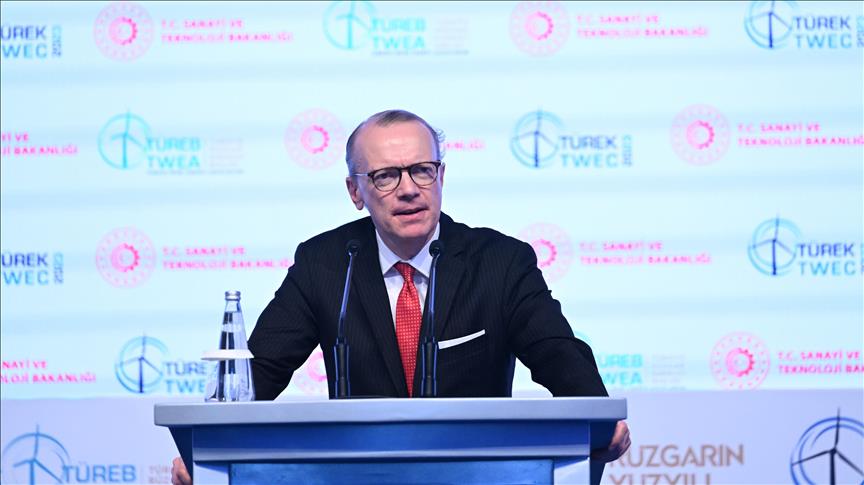Türkiye is part of Europe's aim to boost the continent's wind energy sector, Giles Dickson, CEO of WindEurope, told Anadolu.
The EU's latest wind energy action plan aims to expand Europe's wind energy supply chain by targeting that wind sector equipment, like turbines, is wholly 'made in Europe' and to decrease dependency on China.
Europe's energy strategy, REPowerEU, is a European Commission proposal to end reliance on Russian fossil fuels before 2030 in response to the 2022 Russian invasion of Ukraine, and to this end, it wants to increase wind energy installed capacity from the current 205 gigawatts to 420 gigawatts by 2030.
According to WindEurope, the EU should build over 30 GW of new wind per year on average to meet its 2030 targets, and the EU is offering grants through the European Investment Bank to build new factories.
With the increased costs of wind turbines over the past few years, Dickson said the EU is advocating for wind tenders to be fully indexed to reflect inflation to give the EU a level playing field between Europe's wind energy sector and non-European competitors.
The EU is setting the bar high on what types of equipment can be sold in Europe, Dickson said.
He explained that turbines in Europe now have to comply with global environmental standards, cyber security standards and rules on data residency.
Furthermore, he said the EU will take action against any franchise selling wind turbines in Europe that are unfairly subsidized.
He explained that this is important for Europe and Türkiye as a wind turbine supplier to avoid overdependency on Asian equipment suppliers.
'We have just gotten over our dependency on Russian gas. We don't want to get into a higher dependency on Chinese wind turbines. That is not good,' he said.
He also warned of the data risks involved with wind turbines manufactured outside of Europe and Türkiye.
'Think of all the sensors on those wind turbines generating all of that data. You don't want that data to go outside of Türkiye or Europe. It should be stored and analyzed exclusively in Europe,' he said.
In addition, he highlighted the economic and employment benefits that the wind industry provides, arguing that it is not in the best interests of Türkiye or Europe for these advantages to leave their borders.
'You don’t want to place the economic benefits outside of Türkiye or Europe. That is not in anybody's interest. In short, it is not in Türkiye's interests,' he said.
'The key thing is that for Europe and for Türkiye, the best option is 'made in Europe','made in Türkiye'', he added.
Türkiye's wind sector, with 12 GW of installed capacity, is now the sixth largest in Europe and ranks 12th globally. The Turkish wind industry is also the fifth-largest equipment supplier in Europe.
- Türkiye's rare earth materials
Dickson argued that Türkiye could play a crucial role in reducing Europe's dependency on China's rare earth elements.
'Many turbines have permanent magnets around the generator, and those need rare earths, neodymium, dysprosium and praseodymium. At the moment, we are almost 100% dependent on China for these rare earths,' he said.
However, Türkiye had deposits of these rare earth elements, which he said it should exploit.
Through the Beylikova Fluorite, Barite, and Rare Earth Elements Pilot Plant, which opened in April and is situated in the central Turkish province of Eskisehir, Türkiye hopes to provide 1,200 tons of vital minerals to the local economy.
In the first phase, the facility will focus on the production of seven rare earth elements and their oxides, which will be manufactured for the first time. Rare elements such as fluorite, barite, lanthanum, cerium, praseodymium, samarium, gadolinium, europium, neodymium, and 17 other rare earth elements will be subject to production at the facility.
The Beylikova district is the second-largest rare earth element field with 694 million tons after the Bayan Obo field in China.
Dickson stated, 'Türkiye already does a good job processing materials for glass fiber,' referring to the fabrics used to make glass fiber in wind turbine blades.
By Duygu Alhan and Firdevs Yuksel
Anadolu Agency
energy@aa.com.tr


